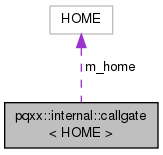template<typename HOME>
class pqxx::internal::callgate< HOME >
Base class for call gates.
A call gate defines a limited, private interface on the host class that specified client classes can access.
The metaphor works as follows: the gate stands in front of a "home," which is really a class, and only lets specific friends in.
To implement a call gate that gives client C access to host H,
- derive a gate class from callgate<H>;
- make the gate class a friend of H;
- make C a friend of the gate class; and
- implement "stuff C can do with H" as private members in the gate class.
This special kind of "gated" friendship gives C private access to H, but only through an expressly limited interface. The gate class can access its host object as home().
Keep gate classes entirely stateless. They should be ultra-lightweight wrappers for their host classes, and be optimized away as much as possible by the compiler. Once you start adding state, you're on a slippery slope away from the pure, clean, limited interface pattern that gate classes are meant to implement.
Ideally, all member functions of the gate class should be one-liners passing calls straight on to the host class. It can be useful however to break this rule temporarily during inter-class refactoring.
